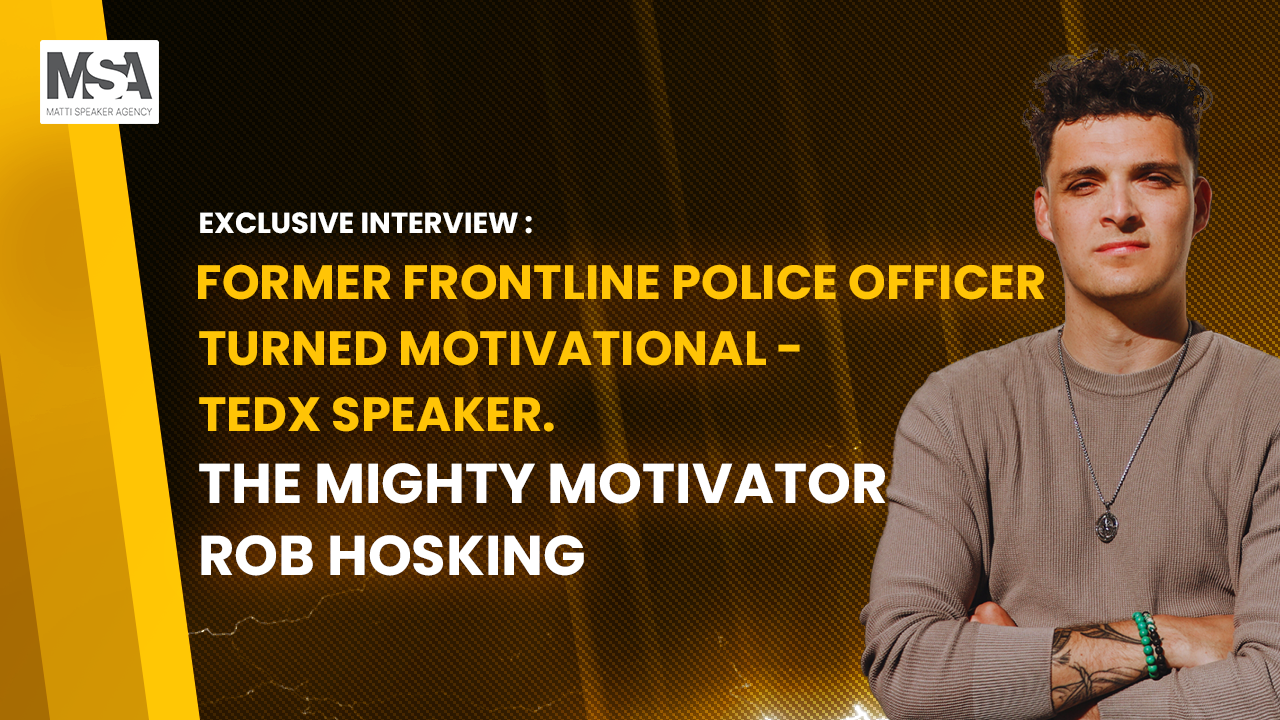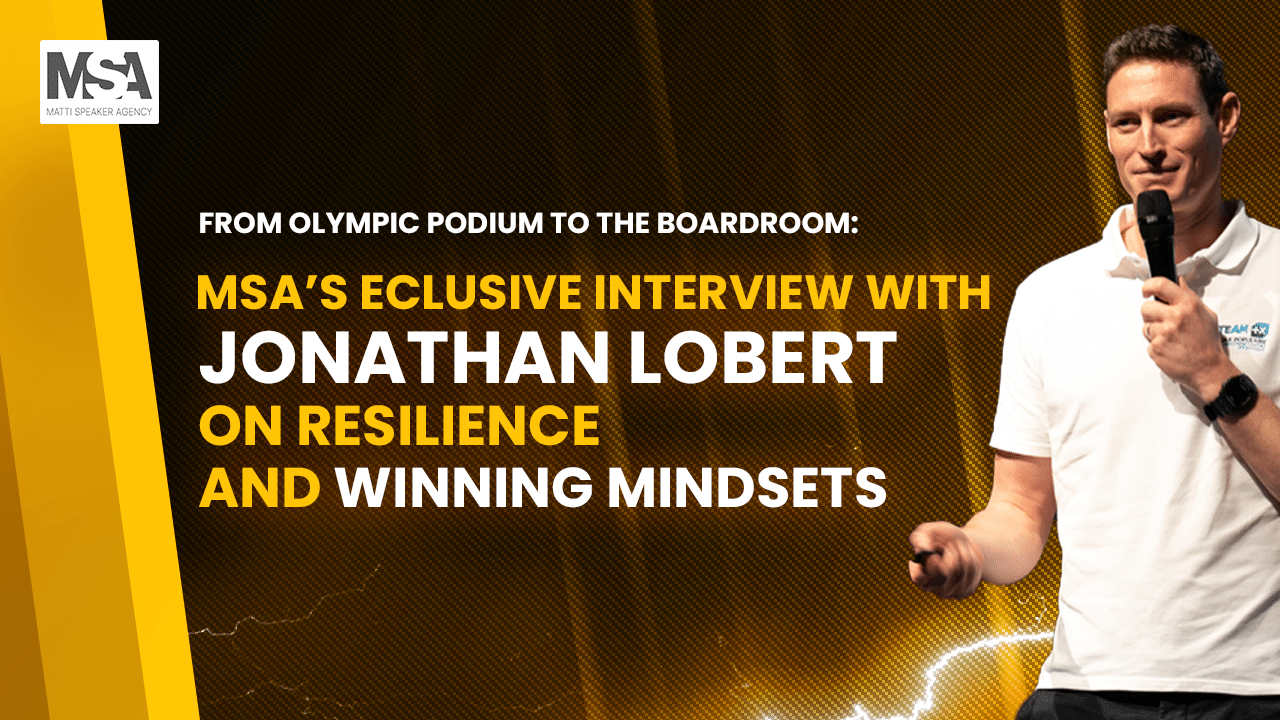In a world defined by constant change and mounting pressure, how do we build true resilience? We often look for answers, but few have a story as powerful as Rob Hosking. A former frontline police officer turned acclaimed motivational TEDx speaker, Rob—dubbed ‘The Mighty Motivator’—has faced life-and-death situations, profound trauma, and a personal mental health battle that nearly cost him everything.
Matti Speaker Agency is privileged to share our exclusive conversation with Rob about his journey, the power of vulnerability, and his ‘Frontline Formula’ for adapting to overcome anything.
You were dubbed “The Mighty Motivator” by Chris Evans. That’s quite a title! How does that feel and how does it tie into your message?
It still makes me smile every time I hear it. Chris gave me that nickname after I shared my story live on air, and for me it really captures what I try to do, to motivate people through honesty and vulnerability. I’m not there to give a polished “everything’s perfect” message. I’m there to remind people that strength comes from the struggles, that you can bounce back, and that you can build adaptability even after you’ve been knocked down. Being called “The Mighty Motivator” is fun, but really, it’s about showing others that they can be mighty too.
You often say, “Mission first, people always.” Explain what that means to you.
That phrase became my north star when I was a tutor constable, training and mentoring new officers. The mission, keeping the public safe, always came first, but I quickly realised that you can’t achieve that mission without looking after your people. If they’re burnt out, unsupported, or just running on empty, you’ll never get high performance. So I made it my personal mission to make sure my team were thriving, not just surviving. I checked in with them, had real conversations, made sure they felt valued. Because if you invest in your people, the mission looks after itself.
You talk about something called The Vest Analogy in your talks. What is that?
It’s inspired by my time on the frontline. Every officer has a stab vest, it’s heavy, but every piece of equipment on it has a purpose. I started to see it as a metaphor for our work lives. For example, the radio represents communication, staying connected and speaking up when things get tough. The handcuffs represent control, knowing when to let go of what you can’t control.
When I share this with audiences, I ask them: What’s in your vest? What tools do you carry that help you face your challenges? It’s about helping people realise the things they need to carry with them every day to ensure they adapt and overcome anything.
You focus heavily on adaptability, how to thrive in changing environments. Where does that emphasis come from?
In policing, every shift holds unknowns. The plan you arrive with often fragments within minutes. I found myself making life-or-death decisions under emotional weight, while trying to keep my team together, my mind sharp. The same mindset I now bring to organisations.
In my keynote “The Frontline Formula: How to Adapt and Overcome Anything,” I tell audiences that success in change is taking the first step before you feel ready, trusting the process, and recognising that even a detour is better than standing still. Because in a world where change is constant, your ability to pivot becomes your edge.
You’ve said before, “It’s not a mistake, it’s data.” Can you explain that mindset?
That’s one of my favourite reframes. For years in the police, and in life, I used to beat myself up for mistakes. But the truth is, mistakes are feedback. They’re data. They tell us what worked, what didn’t, and what to try differently next time. When you shift your mindset from “I failed” to “I learned,” everything changes. It removes fear and builds psychological safety, not just for you, but for your whole team.
If you can create an environment where people feel safe to fail, they’ll feel safe to grow. That’s where high performance and adaptability truly begin.
You place leadership, teamwork, and mental health under this umbrella of adaptability. How do those threads connect in your story?
Authenticity is the common thread. In the police I learned that leaders who hide their human side lose their teams. Men especially are told to be strong, silent, unbreakable, and that became my prison. When leadership is authentic, teams feel safe to say “I don’t know,” “I made a mistake,” or “I need help.” And when men feel safe to say those words, the stigma begins to lift. So for me, adaptability means being real, recalibrating when required, and building teams where the small wins matter. Because those small wins, celebrated, become the bedrock of resilience.
Just how important is it to continue raising awareness about mental health, especially in the workplace, where it can sometimes feel overlooked?
It’s absolutely imperative. Yes, we’ve come a long way, but there’s still so much to do. We need to completely redefine what workplace wellbeing means.
Yoga sessions and pizza Fridays are great, but they’re not wellbeing. True wellbeing is about culture. It’s about how staff treat each other, the language managers use, the workloads people carry, and whether they feel valued and safe to speak up.
Research shows that 69% of people say their mental health is most affected by their manager. That says everything. You can’t have a “wellbeing culture” if your leadership style undermines it. In my talks, I tell audiences that happy teams are not just good for morale, they’re good for business. Studies show happy staff are 13% more productive.
So yes, awareness is key, but action is what really matters.
What would you tell an organisation that’s about to embark on change and is worried about losing control?
You won’t lose control by adapting; you’ll lose control by staying rigid. Change will happen to you or through you. My message: prepare, yes, but expect the unexpected. Let your team see the roadmap but be ready to draw a fresh one. Trust becomes your new control.
I say to leaders: ask yourself not “How do I prevent disruption?” but “How do I harness disruption?” Because every unexpected twist is a chance to build stronger culture, deeper trust and more resilient people.
Finally, what’s the key message you hope people take away from your story and your talks?
That vulnerability is a strength and it’s no longer enough to just adapt to change, we need to adapt well to it.
I used to think emotions were a sign of weakness. I thought “real men” didn’t cry or ask for help. But that belief almost cost me my life. Now I know the opposite is true: real men do talk, do cry, and do ask for help.
Resilience isn’t about bouncing back, it’s about bouncing back well. It’s about learning, growing, and adapting through the pain.
If my story can encourage even one person to open up, to ask for help, or to rethink what strength really means, then it’s all been worth it. My talks help staff embrace change and adapt better to whatever is thrown at them.
Rob’s journey from the frontlines of policing to the global stage is a powerful testament to the human capacity to adapt, heal, and lead with authenticity. His message is not just inspiring; it provides a practical, actionable formula for building resilient teams and thriving through change.
To bring this transformative message to your organization and learn how to apply ‘The Frontline Formula,’ contact Matti Speaker Agency today to book Rob Hosking for your next event.



